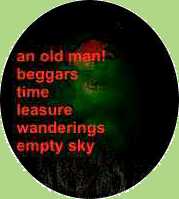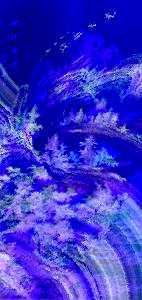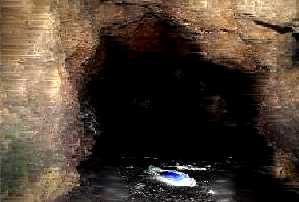![]() Aristotle
taught while pacing to and fro. Hobbes, Nietzsche, and Kierkegaard
thought deeper on their feet. Heisenberg and Bohr strolled while
discussing the latest permutations of physics and war. Wordsworth
wrote, "Happy in this, that I with nature walked." Saigyō,
Bashō, and others sojourned through Japan, while Dōgen
sat and let the mountains walk for him. Santōka, sheltered
in wayward temples, begged enough for one night's room and board,
or stayed with friends, sometimes too long.
Aristotle
taught while pacing to and fro. Hobbes, Nietzsche, and Kierkegaard
thought deeper on their feet. Heisenberg and Bohr strolled while
discussing the latest permutations of physics and war. Wordsworth
wrote, "Happy in this, that I with nature walked." Saigyō,
Bashō, and others sojourned through Japan, while Dōgen
sat and let the mountains walk for him. Santōka, sheltered
in wayward temples, begged enough for one night's room and board,
or stayed with friends, sometimes too long.
First I plotted a linear path, carried on the shoulders of giants. Now the world is a presence that besets us, and the physiognomy of its contours, both naturally and architecturally, are the occasions for our own corporeal unfolding. Body and world gather and form each other in a mutual and dialectical dance. I notice, for instance, that my own movements, the way I walk, feel different, and probably are, when I walk in circles.
|
|
 |
|
Walking
the back roads of northern Japan, |
Living in Paris was a Russian named Pankrotov, whom most critics called a genius. One night, all his paintings were destroyed in a fire. After this, he never painted again. One reason was that is essential, claims Deleuze, is to have an animal relationship with animals. Deleuze draws his conclusions from watching people walking their dogs down his isolated street, observing them talking to their dogs in a way that he considers 'frightening.' He reproaches psychoanalysis for turning animal images into mere symbols of family members, as in dream interpretation. Deleuze concludes he was just tired. Another was that he could never measure up to the legend created around those paintings that no longer existed. Now he makes his living anonymously repairing the damaged works of others. "There is only one real sacrifice an artist can make, and that is to accept the possibility of being forgotten," he said. Later we learn it was he who had set the fire, and that one painting, a portrait of his daughter, survived.
When I heard there'd been a fire in the building, I knew it was in the Zen priest's apartment. The Buddha was giving the Fire Sermon again, while overhead sprinklers and Fire Department hoses, made a Ganges of the floor, dripping down to the floor below. "Were you here yesterday?" a woman asked me in the lobby. "Yes," I replied. "I was home all day." "When I was a child," she continued, "someone locked me and my brother in a barn, and set it on fire. I'm afraid of fires now."fumarole
solfatata
vent
tears
intrusion
fault.
![]() On
the edge of the forest there's a zoo. In its cages, animals
neurotically pace. I've been there only once. On September
12, 2001, I went because on the day after the carnage in New York,
admission
to see these captives was free.
On
the edge of the forest there's a zoo. In its cages, animals
neurotically pace. I've been there only once. On September
12, 2001, I went because on the day after the carnage in New York,
admission
to see these captives was free.
|
|
It
was not the dead bird that moved me, but its plummeting from
the sky. It had been free up there, riding invisible waves; while
human nature, never content, must find the Cave of the Winds, asking questions no other species would think to ask, drawing knowledge even from what it can never reach they die of the tension of not-knowing, / the apprehension. / Fear sits in their guts, / thus the courage, the quickness, the shyness of a deer asking: What kind of animal is this? |
| Brains
diffuse light through horizons of bark |
Trees
leap as the keen edge sings through their heart |
|
Dis |
The next moment—more than an hour had passed—I woke to somewhere else. Not sleep, nor trance—I'd don my feathers and mask—, but Midazolam, Fentanyl, corn meal sprinkled to bless the way to a cliff at whose precipice consciousness halts:
Surely in those great depths there is one
Small isolated fin of brilliance that belongs
To death alone (maybe its efficiency, maybe its age),
Flickering like a dim torch no one can recognize
On the opposite side of a foggy gorge...
What I could clearly see yesterday,
this morning is hidden. I know that what my brain has secreted is
constantly recombining, tinkering with an imaginal grammar and mouthfuls
of words. Now a scrim of trees seems to appear. One tree's trunk
is split open, exposing spires of red splinters. It forms a lean-to
over the path. I slip under it, thinking, Risk is why so few
of us attempt to reach the other side. However, I won't go further,
todayI
have consecrated my life to
changing matter into spirit, with the hope of one day seeing it all.
Seeing its total form, while wearing the mask, from the distance
of death. And there, in the eternal destiny, to seek the face I had
before the world was made, as a tooth is beginning
to nag.
|
opens as |
 |
an ancient
|
I praise those ancient Chinamen
Who left me a few words,
Usually a pointless joke or silly question
| "We approached a pickup truck parked in Cascade Locks and inquired about salmon for sale. The man asked Gordon, ‘You Warm Springs?’ ‘No, Chinese.’ ‘NO WAY! . . . Really?’ He turned to me in utter disbelief. ‘Really, born and raised in Hawaii.’ He stared hard again at Gordon. ‘You sure LOOK Warm Springs.’ Our business transacted we began to walk back to our car. ‘LEARN YOUR TRIBE!’ he yelled." |
![]() Drought,
then two weeks of rain, snow coating the mountains, as the season
nears its end with 70% of normal moisture. Even after the sun squeezes
through some thin clouds, in
the animist world view, spirits may intrude upon man from a
variety of sources: from the pool of ancestral souls, from animals
or trees, or indeed from transistor radios or telephone poles.
All of these, and in fact all things animate and inanimate, living
and dead trees
continue to drip. In puddles that mark the path my face is murky.
When I question the creek , it bubbles...then bursts. This wisdom
is beyond my years.
Drought,
then two weeks of rain, snow coating the mountains, as the season
nears its end with 70% of normal moisture. Even after the sun squeezes
through some thin clouds, in
the animist world view, spirits may intrude upon man from a
variety of sources: from the pool of ancestral souls, from animals
or trees, or indeed from transistor radios or telephone poles.
All of these, and in fact all things animate and inanimate, living
and dead trees
continue to drip. In puddles that mark the path my face is murky.
When I question the creek , it bubbles...then bursts. This wisdom
is beyond my years.
The faces afloat
on the water are never
his own. When they shatter
he holds them together.They show him the mask.
![]() Today
I've been remembering the thrill of my first weeks here. One day,
walking on Yamhill street, imagining a field of fleshy tubers budding
in the dark warm earth beneath the pavement, I came upon a brass
gargoyle mounted on a crimson door. I went inside and inquired about
the building's strange guardian. Although a
successful trip in the literal cave most likely means you exit
by the same route you entered. A successful trip in the metaphorical
cave means you will not. For this reason, the backward glance in
the literal cave means survival, and in the metaphysical cave, it
means the occupants had passed through the throaty
grin so many days of their lives, no one knew its name.
Today
I've been remembering the thrill of my first weeks here. One day,
walking on Yamhill street, imagining a field of fleshy tubers budding
in the dark warm earth beneath the pavement, I came upon a brass
gargoyle mounted on a crimson door. I went inside and inquired about
the building's strange guardian. Although a
successful trip in the literal cave most likely means you exit
by the same route you entered. A successful trip in the metaphorical
cave means you will not. For this reason, the backward glance in
the literal cave means survival, and in the metaphysical cave, it
means the occupants had passed through the throaty
grin so many days of their lives, no one knew its name.
![]() A
man is pushing a baby carriage up the rocky trail, scoring deep ruts
in the mud. What labors our genes assign us! Though in this burden
we find affirmation, already the child is crying to be a person.
Resemblance is all we have to show for the passion of our teleology
and the scars it leaves behind.
A
man is pushing a baby carriage up the rocky trail, scoring deep ruts
in the mud. What labors our genes assign us! Though in this burden
we find affirmation, already the child is crying to be a person.
Resemblance is all we have to show for the passion of our teleology
and the scars it leaves behind.
|
Could it be that once a species' consciousness reaches a critical point, it subsumes the evolution of the phenotype? Are psychologists and meditators, more than biologists, probing the future of the human race? Is to be posthuman to be human too? The path lies before me. Trees ring with memories, ferns wave reticular fingers. A rock had a slight overhang, so that the figure swelled forward gently. When seen from one side, the curve appears as taut as a strung bow. It swells to a supreme point, the maternal belly, then falls away at either end and sinks slowly into the rock, in which the feet |
 |
seem to melt. The upper part of the body curves gently backward, and the head, resting between two rock projections, seems to be reclining, as though shaped like Venus
of Laussel: big-bellied, flat-breasted, wide-hipped, holding a bison's horn incised with phases of the moon foundwith eyes
old as hers
on a limestone
wall
near the famous
cave at Lascaux
I work
my way down the steep hillside. Momentarily tangled in a bramble
of silvery leaves, the
idea of 'remembering' our life in the
trees does not mean recollecting a stream
of day-to-day events. The human organism is its own remembering. The
emergence of the past into
consciousness is inseparable from awareness of sliding on matutinal
dew
toward sandy shoals and slippery rocks flanking an
eschatological brew of foam we've risen from
an unknown source as two currents: one
wheeling, the other running
toward the sea.
